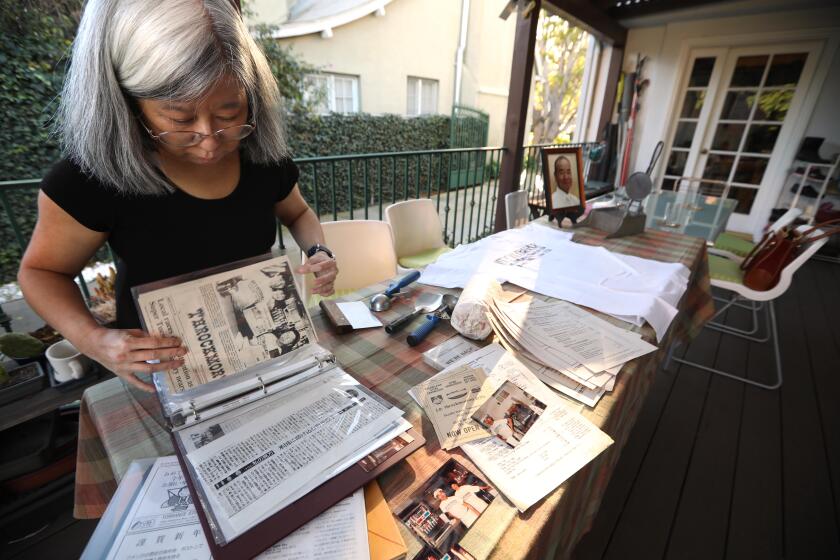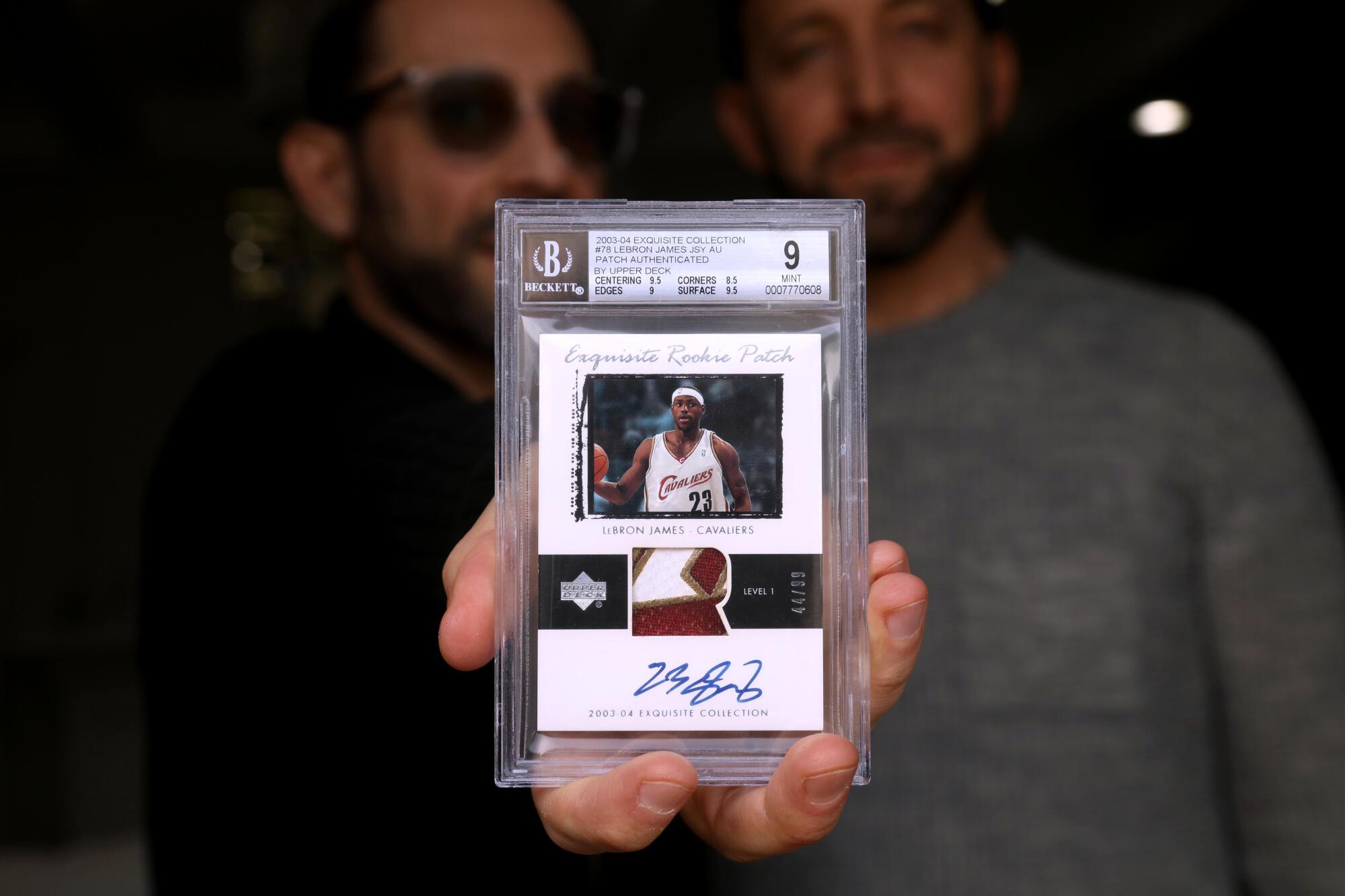
- Share via
To Steven Spiegel, they were all low-ball offers for the LeBron James rookie card he and his brother Alan bought in 2014 — $70,000, $80,000, $90,000. No matter that they’d purchased it for $35,000.
Steven had a strong conviction that it was a “million-dollar card.” Only 99 had been released, and it boasted James’ autograph along with a piece of a jersey he’d worn.
In early 2021, one of them sold for more than $1.5 million. A month later, a slightly rarer “gold” version fetched $5.2 million.
The card market, stoked by the cryptocurrency boom and new investors drawn to the hobby amid the COVID-19 pandemic, was on an epic bull run. It seemed like the perfect time to sell the card with the grandiose name: 2003-2004 Upper Deck Exquisite Collection LeBron James Rookie Patch Autograph.
The brothers consigned the card to Goldin Auctions, a New Jersey-based powerhouse in the world of sports memorabilia. Its founder, Ken Goldin, transformed himself into a celebrity during the pandemic, posting videos on Instagram in which he opened expensive boxes of cards with rapper Drake and actress La La Anthony. Last year, Netflix debuted a reality show about him: “King of Collectibles: The Goldin Touch.”
“I’m motivated by three things: competition, ego and money,” Goldin said in the first episode.
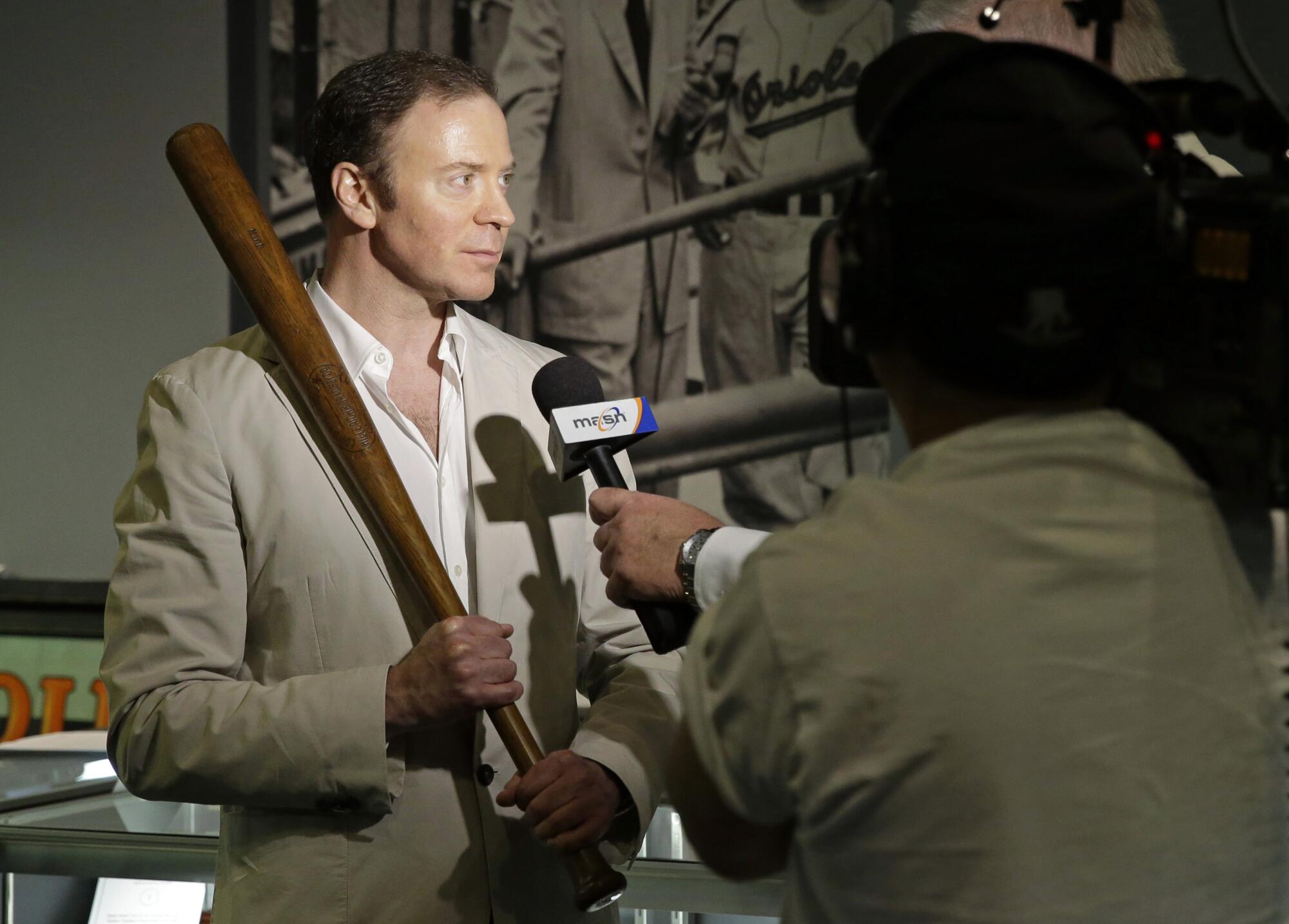
When Goldin solicited the Spiegels’ card for a June 2021 auction, Steven said, he was told it could “smash records.” The card, No. 44 out of 99, was listed June 10. Bidding would unfold online over a few weeks.
Early action seemed to validate Steven’s instincts to sell. After just a day, the Rookie Patch Autograph card had been bid up to $690,000.
But then the Spiegels got a call from Goldin. He was withdrawing the card from the auction.
“I was flabbergasted,” Steven said. “It didn’t make sense.”
The move touched off one of the most bizarre and byzantine scandals ever to hit the sports card industry. At the center of the saga are two questions: Was the card legit, and why did Goldin yank it?
The Spiegels sued Goldin, 58, and his company last year, alleging that his actions conferred legitimacy to a “conspiracy theory” about the card, subsequently rendering it unsalable.
But an attorney representing Goldin Auctions and its founder said in a statement that they “acted appropriately, and the lawsuit against them is without merit.”
According to the Spiegels’ complaint, just after the card was pulled from the auction, they spoke by telephone with an executive from Upper Deck, the Exquisite Collection manufacturer, who told them: Somebody has a “vendetta against you.”
A childhood hobby grows
The sports card industry once lured customers with little more than the promise of a stick of gum — and before that, cigarettes.
Now it’s a far more sophisticated business. It grew steadily in the 2010s, in part because of new third-party authentication companies like Beckett Grading Services and Professional Sports Authenticator, which give buyers confidence they are getting the real deal. They grade cards on a 1-10 scale and seal them in hard plastic cases that aren’t easily compromised.
Highly coveted premium cards, produced in low numbers, bear autographs, swatches of game-used uniforms and more. Boxes containing these cards can cost thousands of dollars — with the rare possibility they hold one worth millions. The thrill of the pastime has always been this gamble: No one knows what’s inside the box.
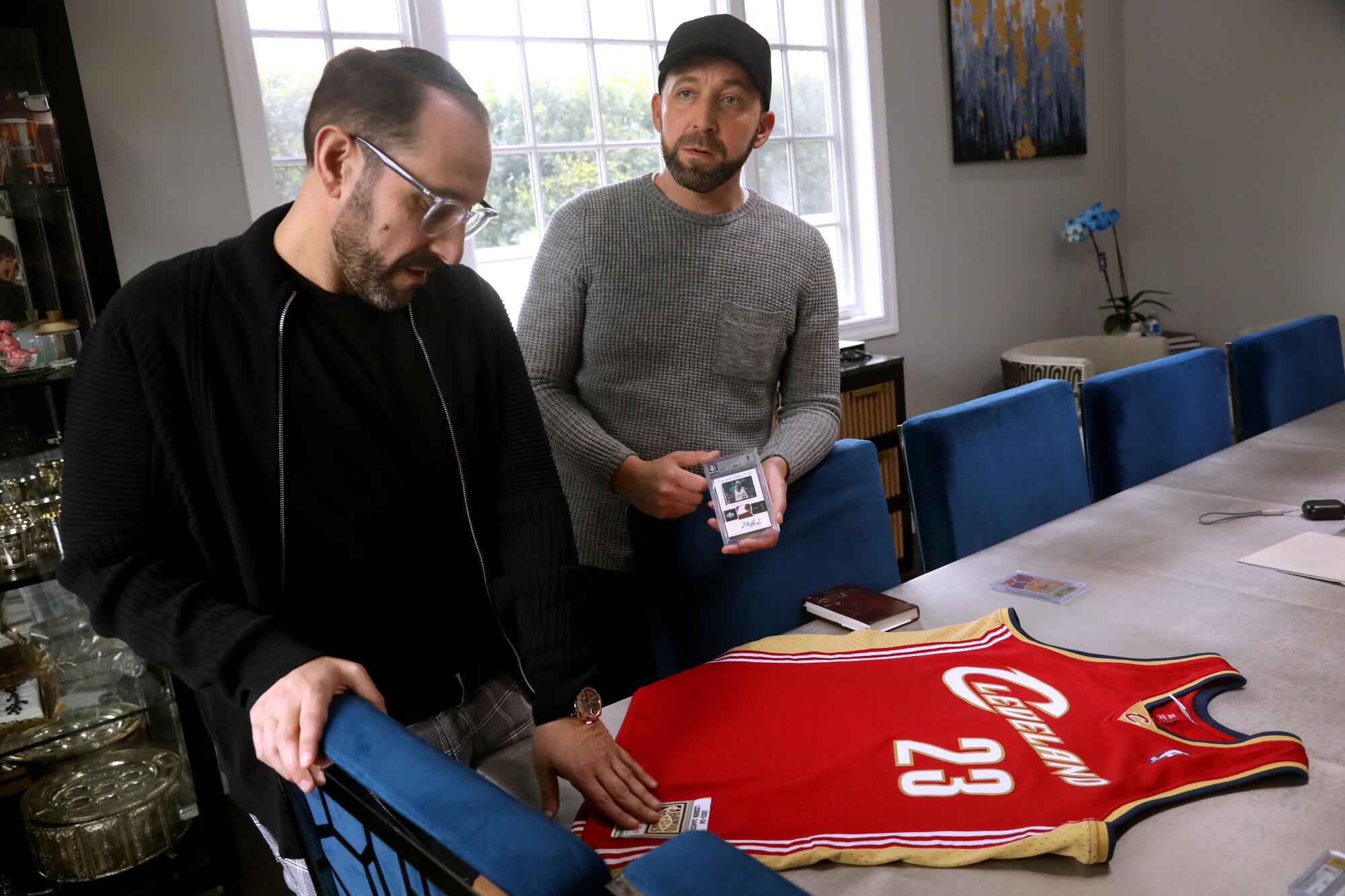
The industry has seen several notable acquisitions in recent years, allowing a handful of powerful interests to cash out — or consolidate control. In 2021, Goldin sold his company to Collectors Holdings, an investment group that includes billionaire Steven A. Cohen. The price wasn’t disclosed, but sports news publication Sportico speculated it exceeded $200 million.
When Steven Spiegel was a sports-obsessed kid growing up in a modest apartment in Brooklyn, he never imagined the cards he swapped with friends could be big business. But it was his entree into capitalism.
In 1992, Shaquille O’Neal burst into the NBA and was an instant sensation. One day that year, Steven and his friends went to Linick’s Toys, a local shop, in search of his rookie card. The store’s owner said that if anyone got one in a pack, he’d buy it for $50.
“Lo and behold, I pulled a Shaq rookie,” Steven said. “And he’s like, ‘50 bucks — it’s yours. You want it?’ I said, ‘Done!’ ”
Beverly Hills Car Club and co-owner Alex Manos have built a following, but lawsuits accuse the dealership of selling vehicles with undisclosed damage, defective parts or other issues.
Steven gave up the hobby in young adulthood, but the skills it taught him helped later in his career — first in finance, then in real estate with his brother. “There is a tremendous amount a kid can learn … teaching them business and economics,” he said. “And learning through their own mistakes.”
Around 2012, Steven — by then married with children — noticed the Hot Corner, a card shop near his Brooklyn home. “I saw a bunch of kids opening up packs,” he said. “It brought me back to those days.”
He went into the store a few days later.
James had just won his first NBA championship, and a Hot Corner employee told Steven that it would be good to invest in the superstar’s cards, singling out the 2003 Exquisite offering.
Owing to the card’s rarity, it took two years for the worker to track one down. Card No. 44 was graded a 9 by BGS, and its jersey patch featured multiple vibrant colors. The Spiegels bought it for $35,000 — the most they’d ever spent on a basketball card.
“I was a little nauseous,” said Steven, 42, a Valley Village resident.
His younger brother was bemused.
“To me, it made no sense,” said Alan, 40. “My initial reaction: It was feeding these childish fantasies of buying cards again. It didn’t register as an investment.”
Steven put the card in a safe.
“We … kind of just forgot about it,” he said.
Social media ‘shenanigans’
Years passed — and the brothers kept turning down offers for the James card. But the market was gaining momentum.
In the mid-2010s, social media became a key element of the collecting ecosystem. The advent of live streaming video allowed users to share the cards they were pulling from packs, effectively creating a virtual card shop.
After some prodding by Alan, the brothers listed the card on EBay in the fall of 2019 for about $370,000. Steven posted a picture of it on Instagram, where he soon got a direct message from a stranger.
“I hope you didn’t pay a lot of money for it, because you got duped,” the person said, according to Steven. “The patch was swapped out.”
The user sent Steven two images of card No. 44 — with different jersey swatches. One was clearly the patch in their card, the other a plain piece of white fabric. “My heart falls to the floor,” Steven said. “This makes no sense. This card’s been sitting in my vault. It’s been encased the entire time by Beckett.”
When Steven asked for more information, the Instagram account disappeared. “It said, ‘User not found,’ ” he recalled.
At the same time, Steven said, he received a message from an EBay user who expressed interest in the card, but noted that internet denizens “were saying the patch was swapped out,” and offered $150,000. Looking back, Steven suspects the Instagram and EBay users were connected.
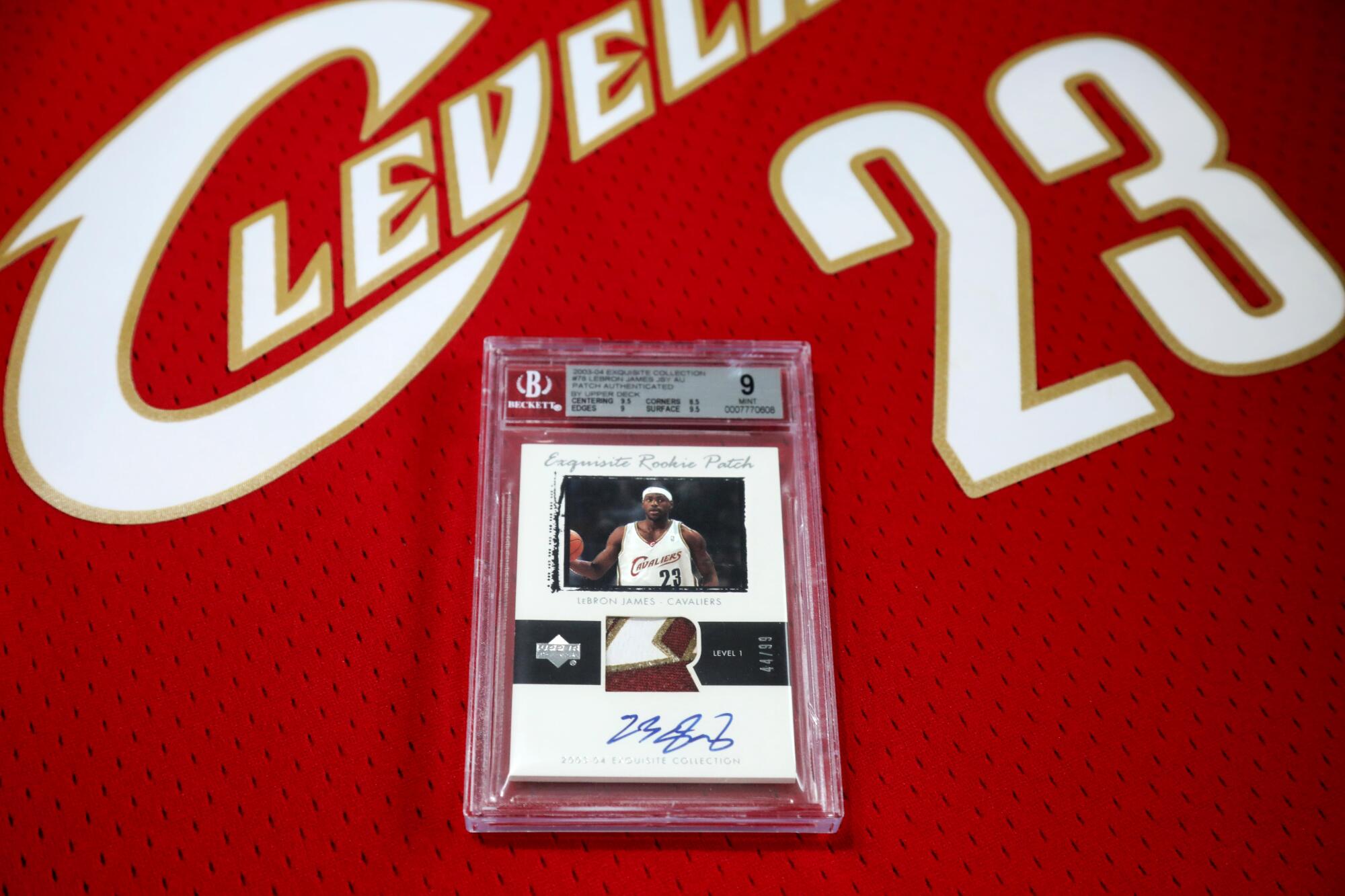
“There was some game going on — some shenanigans,” he said.
Questions about No. 44 weighed on the brothers. Within days, Steven emailed Upper Deck and connected with Chris Carlin, the company’s senior manager of customer experience, who told him via telephone that the card was “100% good,” Steven said.
Carlin gave Steven a letter confirming the card’s authenticity. It explained that the card’s original owner had contacted Upper Deck regarding “concerns about factory damage to it.” The company replaced the card with the one that the Spiegels later acquired, Carlin wrote. He said the original card was destroyed.
The Spiegels, greatly relieved, had the card put into a new holder by BGS, which had updated its cases. Beckett Media, parent of BGS, declined to comment.
Then the pandemic touched off the market’s ascent. Even James got in on the action. During a fall 2020 news conference, the Lakers star explained that he owned some of his valuable rookie cards. “I have two … of my own,” he said. “So I’ll be good for a very, very long time.”
Within months, the Spiegels consigned No. 44 to Goldin.
Ahead of the sale, Steven said, the card’s listing on Goldin Auctions’ website estimated it would sell for at least $1.8 million.
Scuttled sale
In the days before the June 2021 auction, the Spiegels’ card was widely publicized by Goldin Auctions. That’s when an anonymous Instagram account with tens of thousands of followers took aim. It was a self-described industry “watchdog” that went by the name CardPorn.
The account published an Instagram story that asked for more information about No. 44, and posted two purported versions of it: one with the multicolor swatch, one with the plain white swatch, Steven said. They were, he said, the same images he’d received from the mysterious Instagram user in 2019.
The brothers said they weren’t overly concerned, chalking up the post to “some internet troll,” Alan said. Then, the day before the auction was to begin, the lawsuit alleged, Goldin sent them a text message that included the two images of the card that had been circulating online.
The Spiegels sent the Upper Deck letter to Goldin, who verified its contents with the trading card company, the lawsuit alleged, and told the brothers: “You will never have somebody as strong-handed who fights for you like I do.”
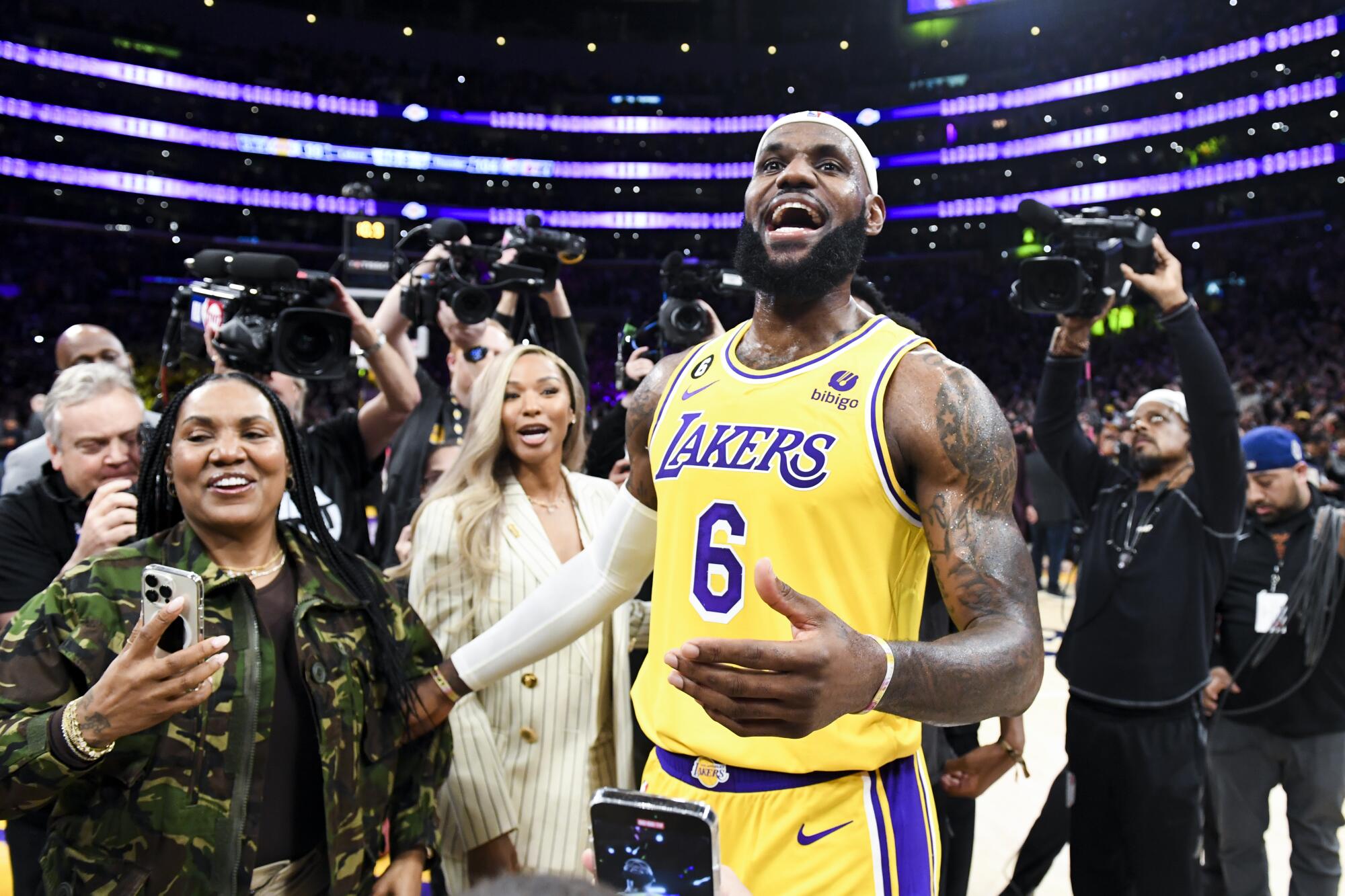
The auction began and bidding was brisk; the card seemed headed toward the $1-million mark. Then came Goldin’s call. According to the lawsuit, he told the Spiegels he was yanking the card because “he was facing too much pressure from CardPorn and its followers” — and that the Instagrammer had persuaded Upper Deck to retract the letter.
“How do you … go with some Instagram [account] named CardPorn, and say this is going to overrule a letter from the manufacturer?” Alan said.
Tracing the arc of the man behind a treasure map revealed a story that entangled a forgotten film star, an “Andy Griffith Show’’ obsessive and other intriguing characters.
Their confusion only grew when Goldin emailed Steven a few days later with a proposition. In the message, a copy of which was included with the brothers’ complaint, Goldin said that he had a “potential offer” from a third party to buy the card for $1 million. The brothers were suspicious.
“We felt like someone’s trying to take advantage, because if the card’s not good, why is there an offer?” Alan said. “It felt very off.”
They declined it.
By then, Goldin had posted an image of the card on Instagram with “WITHDRAWN” across it in red type. Goldin explained that he’d spoken with Upper Deck, which “did not express the same level of confidence” in the card that it had before. According to the Spiegels’ lawsuit, Goldin ended his Instagram post by thanking CardPorn for its “behind-the-scenes work.” Later, however, any mention of CardPorn was removed from the post.
The brothers’ lawsuit draws attention to the relationship between Goldin and the operator of CardPorn, noting that the executive and the Instagrammer had interacted “jovially” on social media. A report by sports business journalist Darren Rovell that was published via Action Network in September asserted that CardPorn was run by a collector named Juan Garcia, who had allegedly tried to fake the provenance of a jersey worn by Michael Jordan. Action Network, a sports media company, also reported that Garcia had flown with Goldin on a private jet to facilitate Drake opening a rare box of cards on an online broadcast.
After details of the jersey controversy surfaced, the CardPorn Instagram account was deleted. Garcia could not be reached for comment.
Action Network also pointed out a link between Garcia and Goldin Auctions, noting that it had sold about $138,000 worth of memorabilia consigned by him.
A veteran and a ‘Hanukkah miracle’
More than a year passed. It was Dec. 22, 2022 — the fifth night of Hanukkah.
Steven’s son Jacob played high school basketball, and was facing Sierra Canyon, where James’ son Bronny starred. That got Steven thinking about a sealed box of 2003-2004 Upper Deck Exquisite that he and Alan had bought a few years earlier.
They’d paid $12,600 for the five-card box and set it aside, figuring it was an investment that would appreciate. Now, though, Steven told Alan that this seemed like the right moment to open it. “Here’s Steven again as a kid ... getting all excited,” Alan said.
After Jacob’s game — Sierra Canyon won 90-53 — the family gathered in their kitchen to open the box. As Steven manned the livestream, Jacob tore away cellophane packaging.
The first two cards weren’t very exciting. When Jacob saw the third, he paused.
“Oh s—,” he whispered. “Holy s—!”
They had pulled another James Exquisite Rookie Patch Autograph.
“Yes!” Steven erupted. “It’s a Hanukkah miracle! Thank you, God!”
The serendipity astounded Steven. “You can’t say this is just a coincidence,” he said.
Pulling another of the rare James cards allowed the brothers to compare the new one to No. 44. A few days later, a friend with a high-powered microscope offered to help.
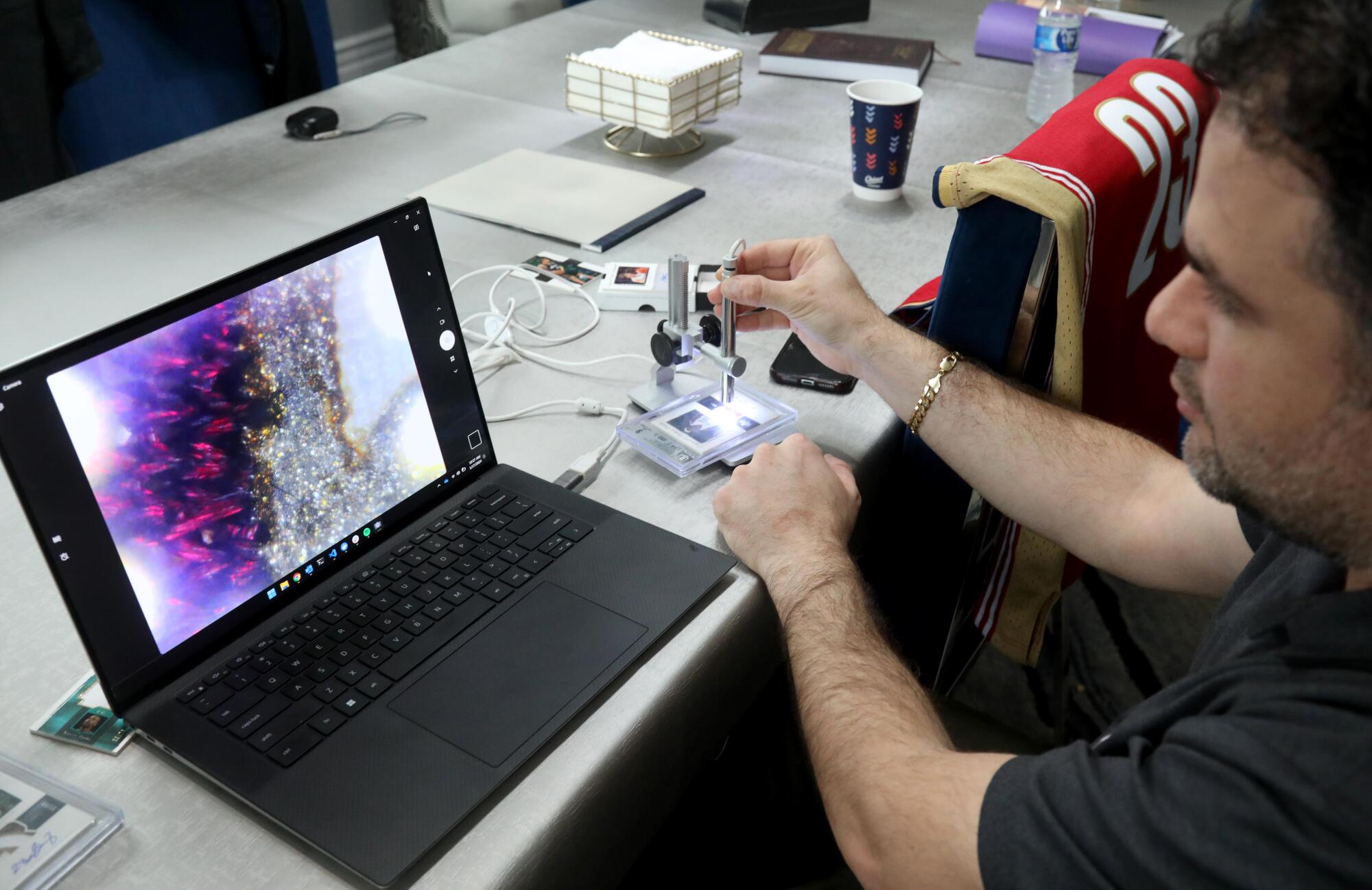
Josh Bouganim, a software engineer, proposed examining both cards under 200x magnification to see if the threads in the swatches matched.
“The weave of the jerseys looks exactly the same — the gold glitter is exactly the same,” Bouganim said.
The brothers felt vindicated. Soon a surprising figure proposed an additional test.
Bobby Middleton had watched when news of No. 44’s auction withdrawal hit Instagram. The Kansas card collector was disheartened — because he said he knew the card was legitimate. Middleton chimed in on Goldin’s post about the situation, saying he had a photo of the card from 2008 that showed it with the multicolored jersey swatch.
“I felt like somebody was getting screwed,” Middleton said, “and it wasn’t fair.”
In December, after pulling the second James card, Steven reached out to him for more information on No. 44.
Middleton, an Army veteran who collected Exquisite cards while deployed to Iraq in the 2000s, told the Spiegels about his image of the card — and that he had pictures of nearly all the other special James Exquisites. He’d amassed them while researching the card ahead of his purchase of one in 2008. And he wanted to help.
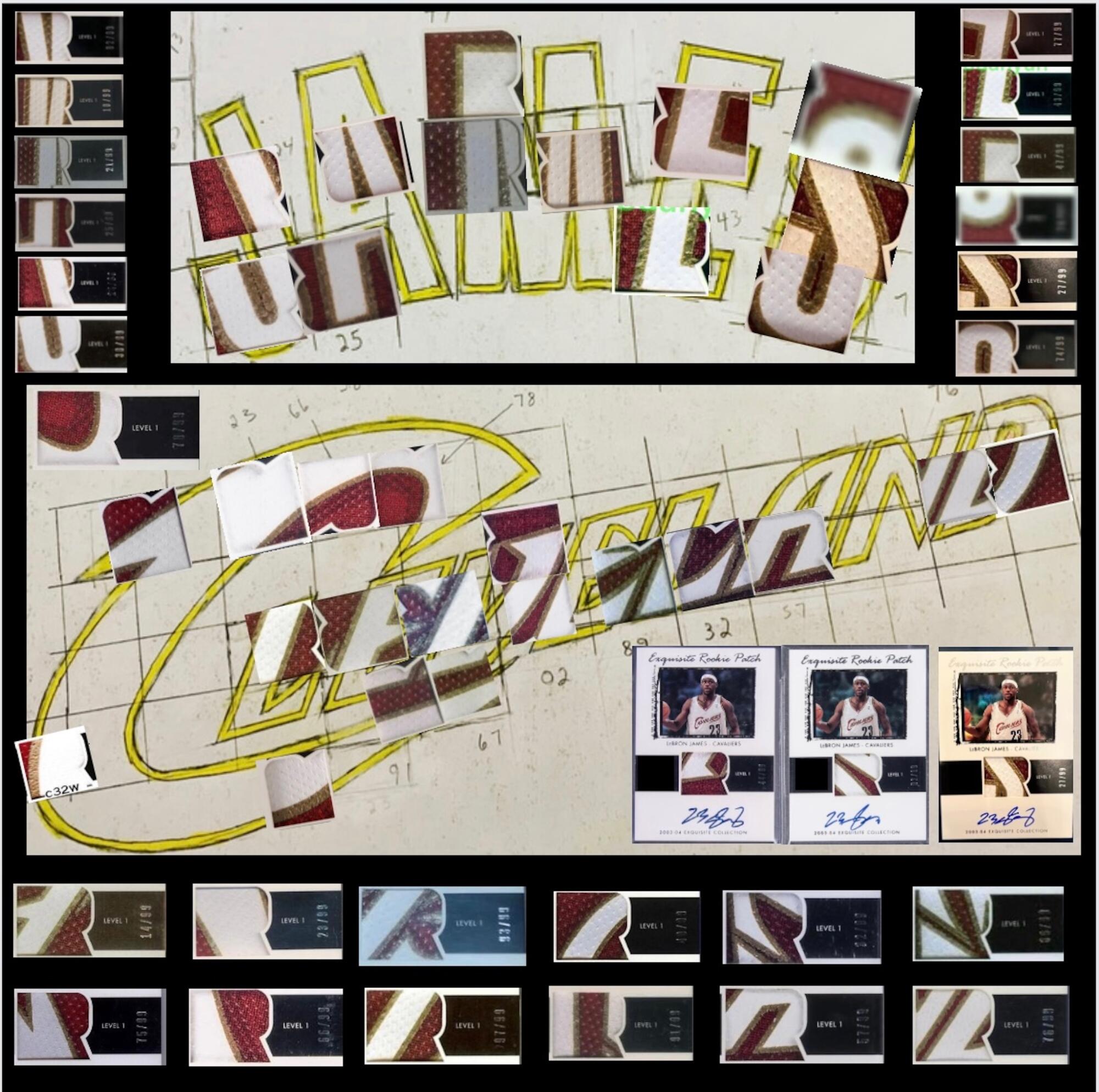
“I bet you it’s like a puzzle,” Middleton, 47, told the brothers.
So Middleton began fashioning a puzzle board of sorts. Over a sketch of a James jersey, he superimposed a grid of squares. He figured that the square fabric swatches would fit together.
Middleton was able to fill in several of the squares that surrounded the space where the No. 44 card’s swatch would go. And it fit perfectly — in the “V” of “CLEVELAND.”
“I was like, oh my God!” he said. “I sent that to [Steven]. He almost passed out.”
Steven said he saw the hand of God in Middleton’s work.
“In my gut the whole time I knew that this would come out,” Steven said. “I didn’t know it was Bobby who would end up doing it. But I believed that God was going to show a way — that this was going to prove itself out.”
The legal fight
Three months after the “Hanukkah miracle,” the Spiegels filed suit in U.S. District Court in New Jersey, alleging, among other claims, that the actions of Goldin, his company and the then-unknown person behind CardPorn left them unable to sell the card. They’re seeking at least $3 million in damages.
Goldin Auctions and its founder denied the allegations in a court filing.
“Goldin exercised its contract right to withdraw this LeBron RPA card from auction in its discretion based on the information available and because there were concerns about the card’s authenticity,” Jonathan Parente, attorney for the defendants, said in a statement. “Goldin looks forward to presenting a complete picture of the evidence and defending its position in court.”
A real-life “Peach Pit” in Beverly Hills served devotees burgers for years, until it closed suddenly in 1997. Now, the family behind Jeremiah P. Throckmorton Grille explains all.
Central to the dispute is the photograph that purports to show the card with a white jersey patch. The lawsuit alleged that the image, which CardPorn passed off as “definitive proof” of the card’s inauthenticity, was doctored with Adobe Photoshop.
In a Feb. 29 court filing, the Spiegels’ attorneys included an email they received from a lawyer representing Upper Deck saying the company had reviewed the underlying facts and reconfirmed the card’s authenticity. “Upper Deck stands by and supports the Oct. 16, 2019, letter from Chris Carlin and has never retracted its support for Mr. Carlin’s letter,” the message said.

The lawsuit shines a spotlight on Carlin. The complaint alleged that he’s the one who told the brothers that someone had a “vendetta” against them. After 24 years at Upper Deck, Carlin left in 2022 for a role at Collectors Holdings — the parent of Goldin Auctions and PSA.
Upper Deck, Collectors Holdings and Carlin did not respond to requests for comment.
In a spring 2023 motion seeking dismissal of the case, Goldin Auctions and its founder argued that Upper Deck’s 2019 letter did not specifically vouch for the authenticity of the card’s jersey patch, and alleged that Carlin “retracted” the letter in a phone call with Goldin after the auction began. In November, the presiding judge denied the motion. A settlement conference is set for March 26.
No matter the legal outcome, Steven believes No. 44 stands apart from its 98 brethren — in a positive way. After all, he said, none of the others have what he calls “double” authentication from the manufacturer and a grading company.
“That card,” he said, “is one of one.”
Even so, the notion of a $1-million sale is, for the time being, off the table. The James card’s value has continued to drop with the industry’s slide. In December, one sold for $268,400.
Times staff researcher Scott Wilson contributed to this report.
More to Read
Sign up for Essential California
The most important California stories and recommendations in your inbox every morning.
You may occasionally receive promotional content from the Los Angeles Times.



